The classiest fam in Hollywood loves Mara's barrettes; this time Violet rocks them. Nice. Buy em here, and pass it on.
Category: tip
Items containing recommendations, suggestions, or red-hot gossip.
File this one under: Holy crap. It has come to the attention of the tabloid-reading world that Jennifer Garner was seen wearing red barrettes! But, wait, there's more. A certain barrette-making friend of ours made them. By hand. In San Francisco.
This is from Just Jared, and I must say: If the blog really is just a guy named Jared writing about celebrities, my hat is off to him. He publishes some tidbit of celebrity gossip roughly every 5 seconds. That's dedication, homes. If you're interested in the barrettes, you can buy a pair for yourself at Little Something; if you're concerned that they'll make you look like Jennifer Garner, you can ask Mara for some guidance in the proper way to wear them.

I'm glad that the barrettes got the full paparazzi treatment. A couple of photos just wouldn't have been sufficient. Better get 17 and be safe. Check em all out.(Congratulations, you big loser).
I like to tell myself that I don't read stuff like this, but Esquire's got a pretty excellent list of "75 skills every man should master".
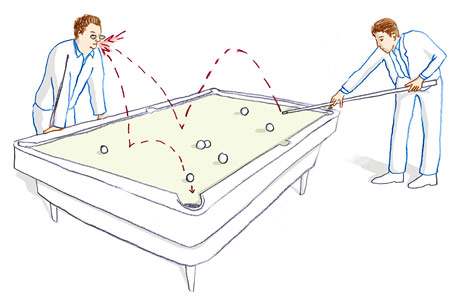
33. Hit a jump shot in pool. It's not something you use a lot, but when you hit a jump shot, it marks you as a player and briefly impresses women. Make the angle of your cue steeper, aim for the bottommost fraction of the ball, and drive the cue smoothly six inches past the contact point, making steady, downward contact with the felt. Illustration: Leif Parsons.
There are some good, less predictable skills: 5. Name a book that matters; 21. Argue with a European without getting xenophobic or insulting soccer; 52. Step into a job no one wants to do.And then there are the predictable things:
Drinking-related stuff: 17. Make one drink, in large batches, very well; 24. Know his poison, without standing there, pondering like a dope; 32. Describe a glass of wine in one sentence without using the terms nutty, fruity, oaky, finish, or kick.Outdoors-related stuff: 14. Chop down a tree; 26. Cast a fishing rod without shrieking or sighing or otherwise admitting defeat; 51. Build a campfire; 55. Point to the north at any time; 68. Find his way out of the woods if lost; 69. Tie a knot; 74. Know some birds.Sports-related stuff: 4. Score a baseball game; 11. Swim three different strokes; 65–67. Throw a baseball over-hand with some snap. Throw a football with a tight spiral. Shoot a 12-foot jump shot reliably.
Social context?
I would think that Esquire has made lists like this in the past, and if so I think it would be interesting to compare lists across time. For instance, there's nothing explicitly sports-knowledge-related or steak-knowledge-related — "Have a favorite team," "Know the difference between a New York Strip and a T‑Bone" or something like that — all of which seem like they'd be requirements in the past. It would also be interesting to know if lists like this are recent developments. Would the Esquire magazine of Norman Mailer's era craft a list like this? Probably not, actually. Or, if they did craft lists, they'd be one-item lists: "1. F*** lists."Via BuzzFeed.
It's not a word, but lots of people like to use it as if it were. Over the past few years, I've heard it more and more often, but today was the first day I've ever seen it in the mainstream media. Hmmm.
Is there something deficient about "influential" or "resonant?" What about affecting, authoritative, controlling, dominant, effective, efficacious, forcible, governing, guiding, important, impressive, inspiring, instrumental, leading, meaningful, momentous, moving, persuasive, potent, prominent, significant, strong, substantial, telling, touching, weighty, beating, booming, deep, electrifying, enhanced, full, intensified, loud, mellow, noisy, orotund, plangent, powerful, profound, pulsating, pulsing, resounding, reverberant, reverberating, rich, ringing, roaring, round, sonorant, sonorous, stentorian, strident, thrilling, throbbing, thundering, or thunderous?
I've spent a lot time combing through the archives of Paper Cuts, the blog of the New York Times Book Review editor Dwight Garner. It steers clear of smartypantsness, focusing on what one might call the lighter side of serious literature. In fact, most of the content is on the periphery of the strictly literary — a music playlist assembled by Miranda July, a quick, fun interview with Judy Blume, a scan of Jack Kerouac's obituary ("his subject was himself and his method was to write as spontaneously as possible"), a scan of an ad for Ralph Ginzburg's literary supernova Avant Garde that looks like the label on a Dr. Bronner's soap bottle. Garner also has a podcast in which he interviews authors and reviewers from current and upcoming Book Reviews. Every once in a while, you'll suffer through some crap (e.g., Frank Rich gushing and giggling while furtively and unsuccessfully trying to hide the king-size man-crush he has on Don DeLillo). That said, most of the podcasts are informative and interesting.The image at right is from a slide show of advertisements that appeared during the "golden age" of the NYT Book Review — 1962–1973.
News flash: Air travel really sucks right now (Washington Post). A couple of weeks ago, I too was touched by this national nightmare. On a Friday evening, I planned to fly from Dulles to SFO, but got slapped with an SSSS on my boarding pass (expired driver's license) and a long security line and figured I would miss my flight. Good thing it was delayed. For three hours, initially. The gate agents reported that there was bad weather in New York, and this seemed reasonable to me because there were lots of people at the other gates who appeared to be pissed off and tired. Also, the storm was all over the hundreds of TVs that blast CNN at you. I got comfortable and watched an excellent movie (Kurosawa's The Bad Sleep Well) on my computer, fully believing what the gate agents were saying: The flight would not be canceled. They emphasized this: It would not be canceled.
After two more delays, at 2:30am, the gate agents delivered the obvious: The flight would be canceled. Within milliseconds, an entire plane-load of people freaked out, fumed, growled, shouted insults and then scrambled to get re-booked. Lines at the desks: 45 minutes. Hold time on the phone: 45 minutes. Likelihood of getting out of DC in the next 24 hours: Zero. Compensation for our trouble: Zero. Our flight appeared to be the only suckers left at Dulles, but of course the airline blamed the cancellation on acts of God and air traffic control and, on those grounds, they refused to give us even a voucher for a soda. (A recent Washington Post article examines traditional airline excuses). But wait, there's good news: The current issue of Popular Mechanics has an article about the FAA's work on a GPS-based air traffic control system, which will be up and running by … 2025. Ugh.
I won't name the airline (because I am a gentleman), but I encourage you to look for clues in the title of this post. (Specifically in the first letter of each word. Thx, Khoi Vinh for the inspiration.)
Must-see movies / Killer of Sheep
Killer of Sheep is director Charles Burnett's account of life in the LA neighborhood of Watts in the early 1970's. It began life as his senior thesis at UCLA film school and until recently it was never seen outside art houses and museums. Despite all of that, it was among the first 50 films to declared national treasures by the Library of Congress. I saw it earlier this week at the Castro, and it lived up the hype. Burnett's account of his motivations in making the film seems like a good place to start unpacking the stuff that makes it so unique:
I wanted to tell a story about a man who was trying to hold on to some values that were constantly being eroded by other forces, by his plight in the community, and the quality of the job that he had. At the same time he wanted to do right by his family. I didn't want to impose my values on his situation. I just wanted to show his life. And I didn't want to resolve his situation by imposing artificial solutions like him becoming a doctor or a diplomat, when the reality is that most people don't get out. I wanted to show that there is a positive element to his life, and that is that he endures, he's accepted it. [From an excellent interview on Senses of Cinema]
To bring this story to life, he employs a style that seems improvisational, as much documentary as Italian neorealism. But there's also something very new and genuine and particularly American about it — isolation, crumbling buildings, explosions of cruelty and anger, and the constant, chaotic motion of kids leaping across rooftops and crawling under buildings — combined, these things seem to evoke a very American way of poor, urban life.More than anything, the movie makes you wonder at its very improbability: How in the world did he make that? Did he actually plan those moments that seem genuinely serendipitous? Maybe it's that the actors are untrained. The dialogue seems fresh, surprising and authentic even when it's forced. Maybe it's the pacing of the editing. Scenes start abruptly — children emerge from a hole, an entire neighborhood has assembled in a stairwell, kids hide behind a scrap of plywood. Most scenes also tend to end a couple of seconds early, or linger a few seconds longer. Maybe it's the dialogue — it's all mumbles or hollers or growls, with jazz and blues tracks adding rhythmic, sometimes hopeful counterpoints to the imagery. Who knows? What's clear is that it speaks in a true, clear and unique voice. Go see it.
UPDATE 1: A couple of changed picks; UPDATE 2: Some eerie resemblances my bracket and those of SI writers; UPDATE 4: Surveying the carnage: Thoughts after the first two roundsHere's the bracket that I made on the Monday after the seedings were announced.

UPDATE: Since Monday, I've been spending a lot of time reading up on the teams I don't know/care about — in SI.com and its Tourney Blog, statistical analyst Ken Pomeroy's blog, the NYT Bracket blog, and the ever-unfriendly ESPN.com which must hide a lot of its useful stuff behind its subscription service, Insider. In any case, the more you read about the first round match-ups, the more confusing it all gets. I've seen many of the teams play at some point during the season, but I'm totally in the dark on pretty much any team from the Pac 10 (even though I live in California, I just really can't even force myself to care about it) and almost all of the mid-majors. One bracket change came out of this — I can't believe I'm saying this, but Duke seems less likely to get upset by VCU. Duke has been criticized a lot for being soft, sloppy, and generally uninspired, and they're coming off a stinging loss in the ACC Tournament. How could they not be hungry? They've got a bunch of talented players, and it just seems really unlikely that they won't be able to pull off a win against a VCU team that has only played one team in the tournament (Old Dominion). While I've only changed one outcome, my reading did produce many doubts in my bracket, which I detail below. (It also caused me to create three more versions of my bracket to account for the different scenarios that the pundits highlighted — What if Oregon can't play defense? What if Oden explodes on the scene and dominates everyone? What if North Carolina is as good as they appear to be in 3‑minute stretches?)

UPDATE 2: Incidentally, SI writer Grant Wahl's bracket is almost exactly the same as mine. (Actually, same with Seth Davis). Same Final Four; same final game; same outcome. The only big differences are that he has Texas beating UNC (UPDATE 3: Now, so do I), and Creighton beating Memphis, whereas I have both UNC and Memphis getting knocked out in the next round. (I also have more first-round upsets than him … Oral Roberts over Washington State, etc).UPDATE 4 (in the week following the first two rounds): After two straight years in which my bracket burst into flames during the first weekend, I was just happy to emerge with 15 out of 16 teams still alive. Mostly, I got burned by my late changes — Texas beating UNC and Duke beating VCU — and by the fashionable upsets that I stubbornly decided to stick with — Georgia Tech over UNLV, Creighton over Nevada, and Oral Roberts over Washington State, each of which found their own agonizing way of driving a spear through my heart. Crxp.As usual, there were a couple of teams that I was totally, totally wrong about: (1) UNLV. Obviously, these guys can play. I discounted them because (a) who did they beat? and (b) the coach's son seemed to play an inordinately important role. Both seemed like big-time red flags. I ignored the fact that they were experienced, and that they were clearly pissed off by their #7 seed. Who would have thought that the team that rose to the occasion would be composed of hard-nosed guys led by journeyman coach Lon Kruger (UNLV), and not composed of McDonald's All-Americans and led by the sainted Coach K? Seemed unlikely before it happened, but oh how sweet it is in retrospect. (2) Texas. During the two Kansas games, they were dangerously weak at guard. Both games would likely have been blow-outs if Durant hadn't totally gone off in the first 15 minutes of each. Abrams is a terrible ball-handler who needs multiple screens to get his shot going, and Augustin is completely dominant one moment and out-of-control the next. USC forced these guys to play a bigger role by taking away Durant's dribble; good call, Tim Floyd. (Didn't really think I'd be saying those words anytime after 2002). On the other bench, Rick Barnes made no discernible adjustments. Again, not that surprising, in retrospect.The next round looks mostly boring to me, though I guess half the games could be exciting — UNC-USC, if USC is able to hang on while UNC goes on its periodic runs, A&M‑Memphis should display some good offensive firepower (unlike Pitt-UCLA, which almost certainly will be a grind-it-out snore-fest), and KU-SIU which could be exciting if KU has a hard time running its offense against the defense-minded Salukis. Let's hope that it's not exciting in this way.
In 1978, Philip K Dick published an essay called "How to Build a Universe That Doesn't Fall Apart Two Days Later." The title sort of says it all; it's about how to envision the world of a story in a way that lasts. He cuts right to chase, too, confronting the hard question that most writing how-to's like to gloss over: What is worth writing about? Where to start? How to make a statement that doesn't age badly?
… I ask, in my writing, What is real? Because unceasingly we are bombarded with pseudo-realities manufactured by very sophisticated people using very sophisticated electronic mechanisms. I do not distrust their motives; I distrust their power. They have a lot of it. And it is an astonishing power: that of creating whole universes, universes of the mind. I ought to know. I do the same thing. It is my job to create universes, as the basis of one novel after another. And I have to build them in such a way that they do not fall apart two days later. Or at least that is what my editors hope. However, I will reveal a secret to you: I like to build universes which do fall apart. I like to see them come unglued, and I like to see how the characters in the novels cope with this problem. I have a secret love of chaos. There should be more of it.
It just gets better from there, really.

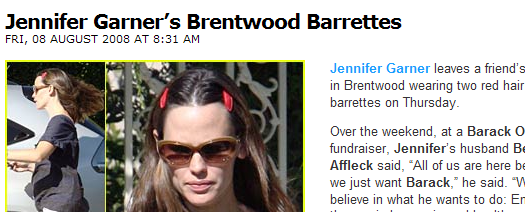

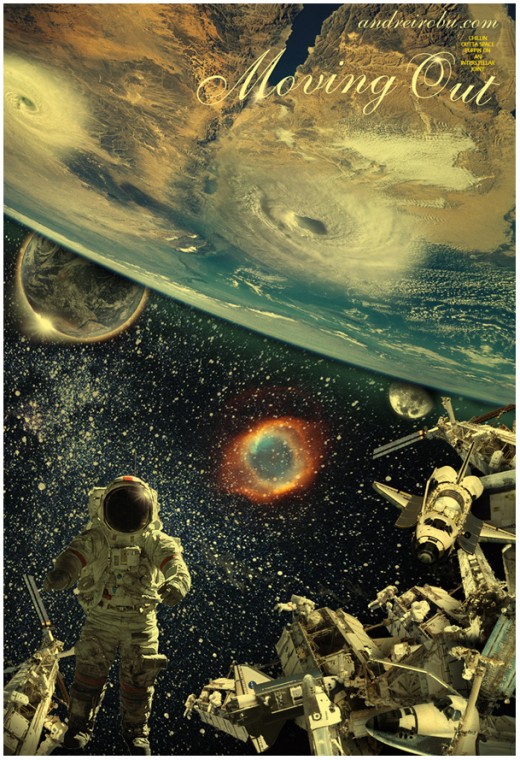
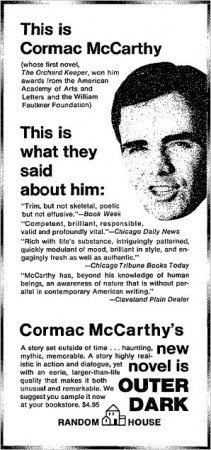

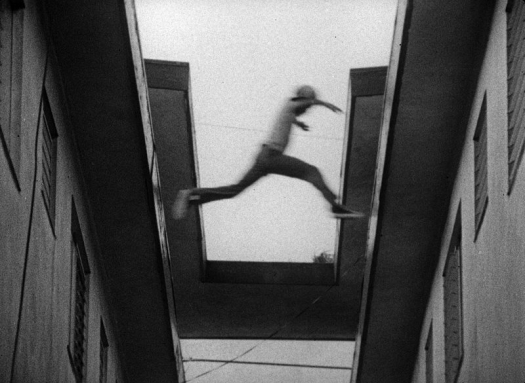 A moment from a beautiful, riveting scene in
A moment from a beautiful, riveting scene in 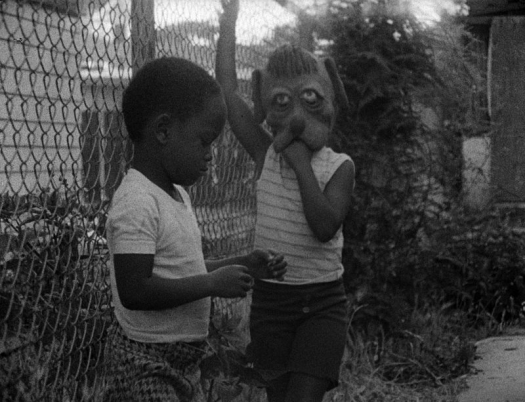 No dialogue. Dog mask. Chain link fence.
No dialogue. Dog mask. Chain link fence.